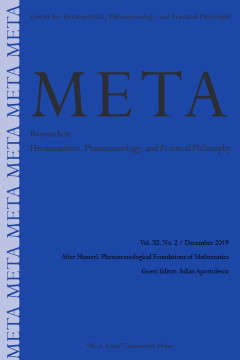Repository | Journal | Volume | Articles

(2019) Meta 11 (2).
On Husserl's thin combination view
structuralism, constructivism, and what not
Mirja Hartimo
pp. 429-449
After a brief outline of his method, the paper discusses Husserl’s view of mathematics by means of two theses, namely the Incompleteness Claim and the Dependence Claim, with which Øystein Linnebo (2008) has characterized non-eliminative structuralism as opposed to the more traditional Platonist view of mathematics. According to the Incompleteness Claim, mathematical objects are incomplete in the sense that they have no non-structural properties. The Dependence Claim holds that the mathematical objects are dependent on each other and/or structure to which they belong. Husserl’s view is shown to be a combination view: It is generally a species of non-eliminative structuralism, of which the two claims hold. However, in addition the Incompleteness Claim motivates constructivist approach to the mathematical objects. Moreover, due to the “thinness” of his “mathematics-first” approach, he is also open to the more traditionally Platonist approaches to mathematical objects.
Publication details
Full citation:
Hartimo, M. (2019). On Husserl's thin combination view: structuralism, constructivism, and what not. Meta 11 (2), pp. 429-449.
This document is unfortunately not available for download at the moment.


